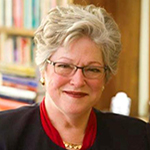By Molly T. Marshall
 I attended Metropolitan Missionary Baptist Church in Kansas City, Mo., this past Sunday. It is a historic African-American church, ably led by Dr. Wallace S. Hartsfield II, scholar of Hebrew Bible. It is a teaching church alongside Central Seminary, and the opportunity for service it offers to seminarians is integral to their preparation for ministry.
I attended Metropolitan Missionary Baptist Church in Kansas City, Mo., this past Sunday. It is a historic African-American church, ably led by Dr. Wallace S. Hartsfield II, scholar of Hebrew Bible. It is a teaching church alongside Central Seminary, and the opportunity for service it offers to seminarians is integral to their preparation for ministry.
I went because I wanted to be near my friends as we all are reeling from the racial terrorism in Charleston. I went because black worship is not afraid to wail lament in the face of suffering, not hesitant to call upon God to bring an end to travail in this world below. I went because I wanted to pray for healing for “the gaping wound of racism,” so named by Jim Somerville at the recent Cooperative Baptist Fellowship gathering.
Pastor Hartsfield offered a most thoughtful analysis of the most recent catastrophe through the story of what happened when Jesus and the disciples descended from the Mount of Transfiguration. The disciples who were left behind could not heal a boy experiencing convulsing episodes. Frustrated by their lack of power, they entreat Jesus to heal him.
The very interesting figure in this narrative, indeed the one Jesus challenges the most, is the father of the boy. When he encounters Jesus, he clarifies the nature of divine and human power. After he describes the lifelong struggle of his son with the destructive forces that cast him about, he says, “But if you are able to do anything, have pity on us and help us.”
Jesus says to him, “If you are able! All things can be done for the one who believes.” It is a strange response. You can almost hear the exasperation in Jesus’ voice. Over and over he has demonstrated God’s power through healing, feeding multitudes, calming storms and taking authority over demonic resistance to God’s reign. There is no lack of power on the part of Jesus; however, the participation of the father becomes essential to the healing.
The father lives at the same intersection we find ourselves in at this juncture of racial mania — Hartsfield’s description of what is convulsing our country. He believes, yet knows of his unbelief. The words of Jesus challenge him: “If you are able.” Jesus wants him to take up his role in effecting the restoration of his son. Persons of good will want to see radical change in our land, stained by the history of systemic and perduring racism, yet wonder if it can really be transformed.
We must confess our unbelief, which shows up in our “weak resignation to the evils we deplore,” as Fosdick’s hymn puts it. Unbelief allows racial mania to continue, and it is at a higher pitch than I can remember in a long while, maybe since the 1960s.
This is not the first time a black church has been the target of racial terrorism. Is it because African-American churches are seen as centers of power, where prophetic fire continues to burn for justice? Is it because the black church is outside the control of majority population? Is it because their hospitality, a powerful demonstration of gospel welcome, makes them vulnerable to the machinations of killers?
I have heard too many people suggest that if the pastor had been armed, he could have prevented at least some of the tragic deaths at Mother Emanuel. Perhaps so, but it would mean forfeiting the higher moral ground. I do not believe guns have a place at church.
The United States is going through the most radical demographic shift a democratic state has ever experienced, and frankly this makes some of those who have benefited from decades-old white privilege nervous. Persons of color will outnumber Euro-Americans in the not too distant future, and the shrill demand to “get our country back,” is heard from those who resist this changing social landscape.
We know too well the structures that buttress racist ideology. In my own metro area, economic development is disproportionately aggregated away from centers of black culture. For example, rather than revitalizing the area where the Negro Baseball Museum and the Gem Theatre and the American Jazz Museum are located, enormous public funding was poured into another entertainment district not too many miles away. And then there are the schools, which fail far more black children than white.
I believe Jesus’ challenge to the father is meant for us, too. We are able, with God’s help, to bring about the necessary changes to create space for the flourishing of all God’s children. It will be labor intensive and require a long obedience. And we must pray. Jesus reminded his disciples, “This kind can come out only through prayer” (Mark 9:29). And through prayer, we are able.
